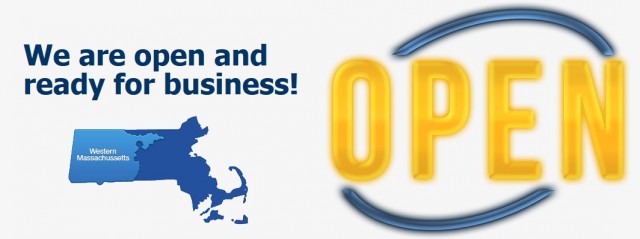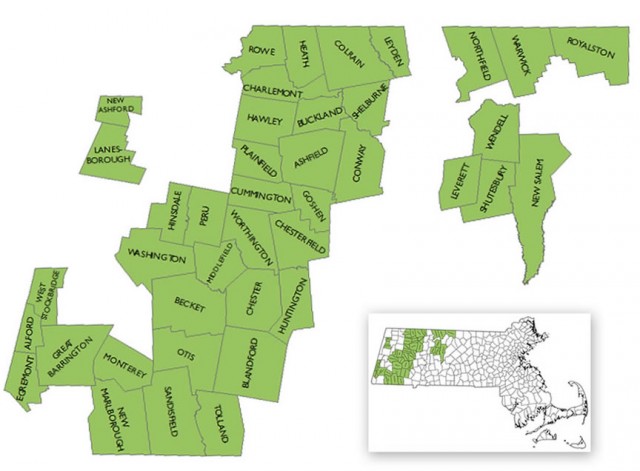 The Massachusetts Broadband Institute has completed construction and testing of the massive 1,200 mile fiber optic network designed to bring 21st century Internet connectivity to rural western and central Massachusetts now largely left out of the broadband revolution.
The Massachusetts Broadband Institute has completed construction and testing of the massive 1,200 mile fiber optic network designed to bring 21st century Internet connectivity to rural western and central Massachusetts now largely left out of the broadband revolution.
After spending $89.7 million in state and federal funds, the fiber project that started construction in 2011 has delivered a robust middle-mile network that, for now, will largely target and serve 1,400 schools, libraries, and government buildings — institutional users that have access to government broadband funding programs to pay for hookups to the fiber network. Finding the money to connect the 333,500 households and 44,000 businesses MassBroadband123 wants to reach is more difficult.
Steve Nelson, the legal/governance chair of the WiredWest Executive Committee, likens it to seeing big water mains being laid along roadways with no way to connect pipes to your house. The media may proclaim the network is complete, but in reality, there is a lot of work that remains to extend broadband service to the residents and businesses that need it most.
Massachusetts Gov. Deval Patrick recently announced funding to support some of the costs of the all-too-critical “last mile” — bringing a connection from the existing fiber network to a home or business. Out of a $900 million bond bill for technology projects, a set aside of $50 million has been reserved for broadband. The bill is waiting for action by the Senate Committee on Bonding, Capital Expenditures and State Assets. If it passes, Nelson believes it will cover about half of the estimated $100 million needed to finish the last mile and begin offering service.

As with many publicly funded, open access broadband networks, private providers are usually invited to participate, but in fact rarely do. Despite calls from Rep. “Smitty” Pignatelli (D-Berkshire 4th District) for Verizon and Comcast to get on board, there is no sign either company is prepared to do so. Nelson says waiting for either company to solve the last-mile problem in areas where they’ve never shown much interest before is like “Waiting for Godot.”
 “It’s time to stop talking and waiting for Comcast or Verizon,” Nelson writes. “We the people of Western Mass. have the power to solve the last mile problem ourselves. Forty-two towns have formed WiredWest, a cooperative dedicated to bringing broadband home to our citizens.”
“It’s time to stop talking and waiting for Comcast or Verizon,” Nelson writes. “We the people of Western Mass. have the power to solve the last mile problem ourselves. Forty-two towns have formed WiredWest, a cooperative dedicated to bringing broadband home to our citizens.”
WiredWest is seeking federal rural broadband funding designated to support rural broadband projects like the one in western Massachusetts. The co-op may even issue a bond backed by participating communities that would allow WiredWest to borrow the needed funds to wire up customers.
Nelson is calling on fellow residents to support the project’s viability by signing up for service when it becomes available. He also urges participating communities to stay united under the WiredWest regional partnership.
“The regional solution WiredWest represents is the only way to achieve the economies of scale, operational efficiencies and cost-effectiveness to make such a network feasible and sustainable,” said Nelson. “It requires a large-enough base of customers and the support from many towns joining forces. A small town going it alone and building its own network is not a viable approach to the big challenge of building and operating such complex and costly infrastructure. It’s running a sled race with just one dog.”


 Subscribe
Subscribe

 “Personally, I would love to see a nonprofit, community-based solution because it would be a more effective use of money, and it would keep it in the fiber-optic realm,” Leppzer told the newspaper. “While [coaxial cable] may be adequate for now, it will not meet the needs of the 21st century.”
“Personally, I would love to see a nonprofit, community-based solution because it would be a more effective use of money, and it would keep it in the fiber-optic realm,” Leppzer told the newspaper. “While [coaxial cable] may be adequate for now, it will not meet the needs of the 21st century.” The WiredWest consortium will be the public-facing part of the project, responsible for marketing high-bandwidth, affordable Internet, phone, high-definition television services and ancillary services to residents and businesses. WiredWest wants to build a 1,952-mile fiber-to-the-home network off MBI’s regional fiber backbone and institutional network.
The WiredWest consortium will be the public-facing part of the project, responsible for marketing high-bandwidth, affordable Internet, phone, high-definition television services and ancillary services to residents and businesses. WiredWest wants to build a 1,952-mile fiber-to-the-home network off MBI’s regional fiber backbone and institutional network. One of the most common questions from eager would-be customers is exactly when the fiber network will be finished and open for business to the public. Funding remains the biggest impediment. The cost of wiring residents for fiber service across the 42-town consortium ranges from $70 million to $130 million. It’s a substantial sum for small communities to cover, but the project does enjoy economy of scale that could ultimately save taxpayer dollars.
One of the most common questions from eager would-be customers is exactly when the fiber network will be finished and open for business to the public. Funding remains the biggest impediment. The cost of wiring residents for fiber service across the 42-town consortium ranges from $70 million to $130 million. It’s a substantial sum for small communities to cover, but the project does enjoy economy of scale that could ultimately save taxpayer dollars.